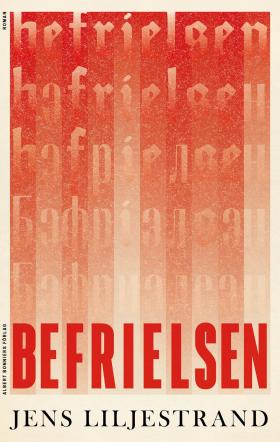
Befrielsen
(Liberation)
by Jens Liljestrand
reviewed by Michael O. Jones
Western and Northern Europeans recently celebrated the 80th anniversary of VE Day, when Allied forces finally defeated Nazi Germany and ended the war in Europe. As momentous a moment as VE Day was, it was only technically the end of the war. Soviet occupation continued in Eastern Europe until 1991, and even the small Danish island of Bornholm was abandoned to Soviet occupation until 1946.
Part historical fiction, part crime drama, part family history, Jens Liljestrand's Befrielsen (Liberation) begins on the small Danish island of Bornholm on 5 May 1945, a few hours before the official end of the war. However, the Danes’ hopes of Nazi occupation finally coming to an end are dashed when the commander of the occupying forces on Bornholm refuses to surrender to anybody but the British. As a result, Soviet forces (with the tacit approval of Britain, France, and America) invade the island and take it for themselves. Their trail of murder, rape, and looting which stretched across eastern Europe in 1945 continued on Bornholm, making the Nazi occupation look positively civilised in comparison.
The main character of the novel is the half-Swedish, half-Danish doctor Edvard, who moves to his dead mother's home on Bornholm after his life in Stockholm falls apart. Treated with suspicion and revulsion by locals and kept at a distance by old friends, Edvard is nevertheless drawn into a mystery revolving around artwork stolen or otherwise missing from Germany. Artwork which, rumour has it, has found its way to Bornholm and is still there. Having no knowledge of this himself, Edvard becomes the object of suspicion from British and Soviet agents all the same. Some locals might even wish him dead, as, unbeknownst to him, he is all-too close to the truth.
Generally speaking, I found this an enjoyable novel, and criticisms I have are minor at best. The plot of the missing artwork and the journey to find the source of the rumours of a treasure island worked well, had unexpected but sensible turns, and kept me turning the pages. It never lost sight, however, of the historical fiction, and provided insights into parts of the story of WWII which rarely seem to get any airtime in the English-speaking world, such as the arrogance and disregard of the victors towards ‘smaller countries’; the horrors experienced by the average German as the Red Army looted and raped its way across Europe; and Britain and America's betrayal of their erstwhile allies by shaking hands with Stalin in 1945. Even the fact that Denmark and Norway were occupied by Nazis at all might be news to many a reader.
As such, it put me in mind of other works, such as Jan Guillou's Blå stjärnan (The Blue Star) and the women who were spies for the Allies in occupied Norway and unallied Sweden, or Sofi Oksanen's Puhdistus (Purge) where Estonians spent years after the end of the war waiting for the English and Americans to liberate them from the Soviets. The subject of Liljestrand’s PhD in literature was Vilhelm Moberg, whose novel Rid i natt (Ride This Night) about a fictitious German occupation of southern Sweden in the 1600s also springs to mind.
But the novel is also driven by Edvard, its protagonist, whom I personally found very relatable and likeable due to being a normal human who reacts how a normal person would in most situations. Edvard is not a heroic protagonist, and from the beginning, the reader is even on guard around him due to the hostility others treat him with and the coldness of his friends. The reader is allowed to believe he was perhaps a collaborator or similar during the war, but ultimately locals mostly objected to his having done his job as a gynaecologist properly and followed his Hippocratic oath as befits his station, including performing abortions on Nazi collaborators.
I was also surprised once again to have an unexpected gay man in a work of historical fiction, but this time his love for men did not read like an afterthought. Within the first twenty or so pages his long-held attraction to his childhood friend Palle is obvious for anybody not making assumptions. Moreover, the reason his life fell apart in Stockholm is that his wife found out about his secret meetings with men in his doctor's office.
The novel comes to a generally satisfying conclusion that answers all the questions and wraps up almost all plot points. It does not end especially happily, with Edvard ending up more of a marginalised outcast than when he started and having lost all his friends (one of whom might well have wished to be more than ‘just’ friends with him). But the case of the missing artwork comes to a conclusion one would not expect, and Bornholm is allowed to start recovering from six years of occupation.
Befrielsen
Albert Bonniers Förlag, 2025, 400 pages
Foreign rights: Bonnier Rights Sweden
Jens Liljestrand is a Swedish author and cultural critic who has written many works of fiction and non-fiction. His works have been translated into many languages and he has received various awards for his novels and other writing, with the most recent being the Lagercrantzen Critics Award (2019), the Axel Hirsch Award (2019) and the Letterstedtska Author's Award (2019). His biography of Vilhelm Moberg, Mannen i skogen (The Man in the Woods: a Biography of Wilhelm Moberg), was reviewed by Kate Lambert in SBR 2019:1-2.
